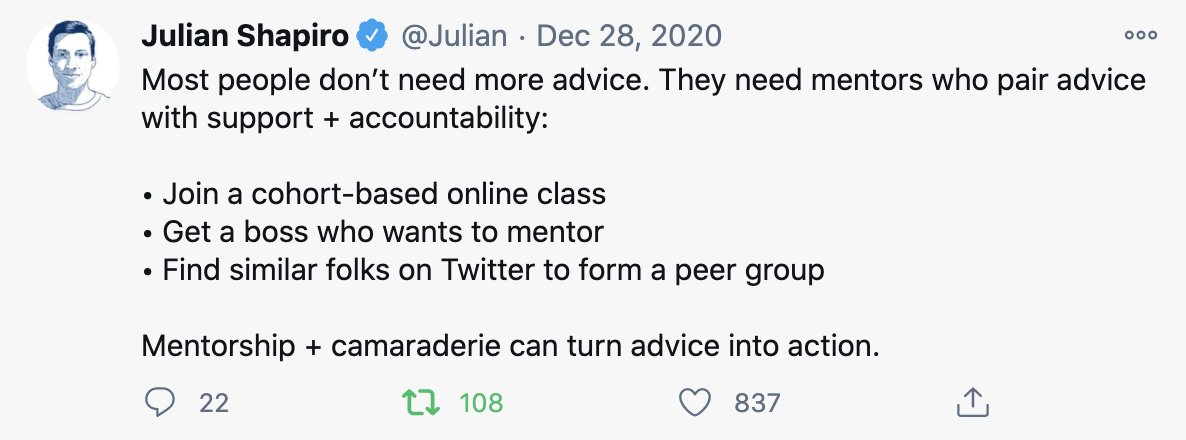This is why I'm not a critic of "cancel culture." It's crucial to impose social costs for the breech of key social norms. The lesson of overreaction is that we need to recalibrate judgment to get it right next time, not that we need a lot more bad judgment in the other direction.
Every single critic of "cancel culture" just thinks the wrong people are getting canceled. pic.twitter.com/DDIVccj8zV
— Michael Hobbes (@RottenInDenmark) February 2, 2021
More from Twitter
Here are some of the best threads I've ever read on Twitter,
All related to
- Startups
- Entrepreneurship
- Indiehacker
- Wealth
- Health
- Life nd philosophy
I'll keep updating them regularly
Read below 👇
1. Getting reach without being luck, best tweet ever by
2. On meditation by
3. On college and eduction by
4. "Deep Year" concept by
All related to
- Startups
- Entrepreneurship
- Indiehacker
- Wealth
- Health
- Life nd philosophy
I'll keep updating them regularly
Read below 👇
1. Getting reach without being luck, best tweet ever by
How to Get Rich (without getting lucky):
— Naval (@naval) May 31, 2018
2. On meditation by
Meditation - The Art of Doing Nothing:
— Naval (@naval) May 16, 2020
3. On college and eduction by
I\u2019ve gotten a lot of bad advice in my career and I see even more of it here on Twitter.
— Nick Huber (@sweatystartup) January 3, 2021
Time for a stiff drink and some truth you probably dont want to hear.
\U0001f447\U0001f447
4. "Deep Year" concept by
Obsessed with this idea:
— Jordan O'Connor (@jdnoc) July 28, 2020
Pick a niche I'm interested in.
Write/study daily about the topic.
Write 100 articles in a year.
Get SEO traffic.
Build email list.
Ask them what they want and build it.
Sell products (physical or digital).
Start fresh with a new niche next year.
You May Also Like
1/x Fort Detrick History
Mr. Patrick, one of the chief scientists at the Army Biological Warfare Laboratories at Fort Detrick in Frederick, Md., held five classified US patents for the process of weaponizing anthrax.
2/x
Under Mr. Patrick’s direction, scientists at Fort Detrick developed a tularemia agent that, if disseminated by airplane, could cause casualties & sickness over 1000s mi². In a 10,000 mi² range, it had 90% casualty rate & 50% fatality rate

3/x His team explored Q fever, plague, & Venezuelan equine encephalitis, testing more than 20 anthrax strains to discern most lethal variety. Fort Detrick scientists used aerosol spray systems inside fountain pens, walking sticks, light bulbs, & even in 1953 Mercury exhaust pipes

4/x After retiring in 1986, Mr. Patrick remained one of the world’s foremost specialists on biological warfare & was a consultant to the CIA, FBI, & US military. He debriefed Soviet defector Ken Alibek, the deputy chief of the Soviet biowarfare program
https://t.co/sHqSaTSqtB

5/x Back in Time
In 1949 the Army created a small team of chemists at "Camp Detrick" called Special Operations Division. Its assignment was to find military uses for toxic bacteria. The coercive use of toxins was a new field, which fascinated Allen Dulles, later head of the CIA

Mr. Patrick, one of the chief scientists at the Army Biological Warfare Laboratories at Fort Detrick in Frederick, Md., held five classified US patents for the process of weaponizing anthrax.
2/x
Under Mr. Patrick’s direction, scientists at Fort Detrick developed a tularemia agent that, if disseminated by airplane, could cause casualties & sickness over 1000s mi². In a 10,000 mi² range, it had 90% casualty rate & 50% fatality rate

3/x His team explored Q fever, plague, & Venezuelan equine encephalitis, testing more than 20 anthrax strains to discern most lethal variety. Fort Detrick scientists used aerosol spray systems inside fountain pens, walking sticks, light bulbs, & even in 1953 Mercury exhaust pipes

4/x After retiring in 1986, Mr. Patrick remained one of the world’s foremost specialists on biological warfare & was a consultant to the CIA, FBI, & US military. He debriefed Soviet defector Ken Alibek, the deputy chief of the Soviet biowarfare program
https://t.co/sHqSaTSqtB

5/x Back in Time
In 1949 the Army created a small team of chemists at "Camp Detrick" called Special Operations Division. Its assignment was to find military uses for toxic bacteria. The coercive use of toxins was a new field, which fascinated Allen Dulles, later head of the CIA



















